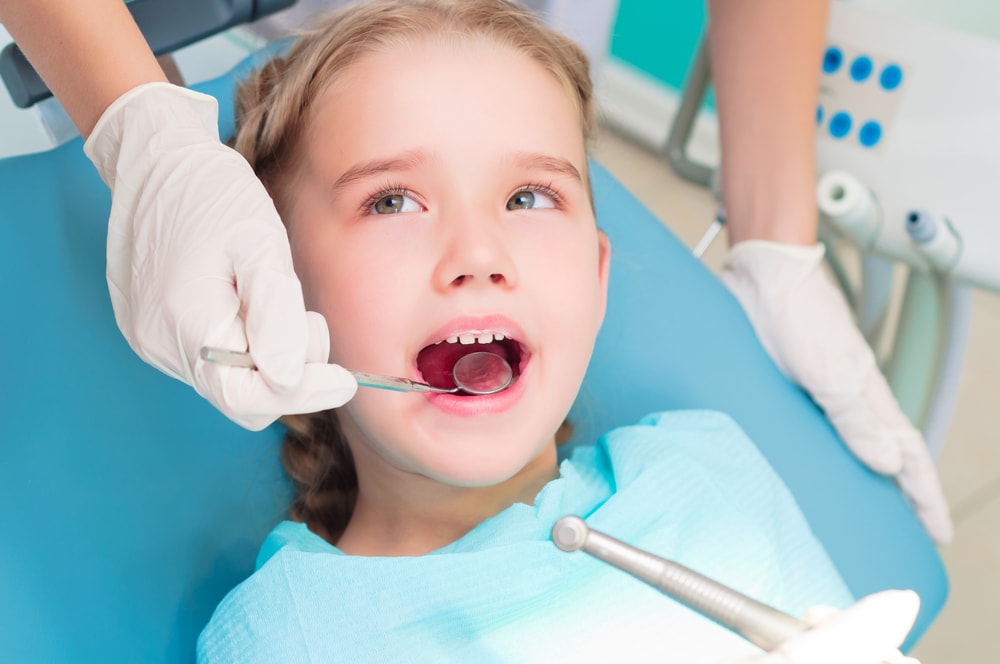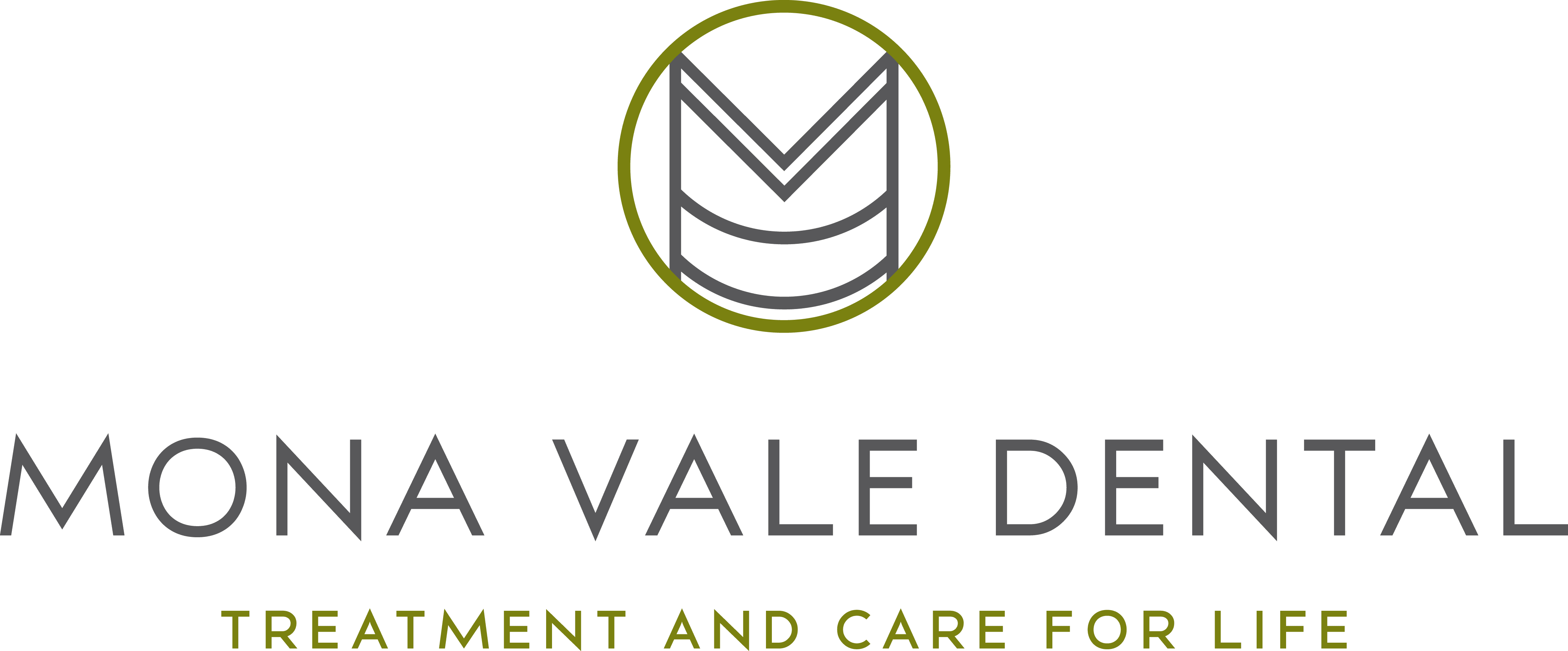Tooth decay in children is a major problem. Unfortunately, most adults don’t realise that cavities are contagious. You must stop sharing spoonfuls of bacteria with your little ones, if you want to help them avoid a lifetime of dental pain.
Parents, we have a problem.
Tooth decay is the number one chronic disease for Australian children.
And in many cases, it’s completely preventable.
No doubt you do everything in your power to make sure your child is healthy. But this can be undone in a heartbeat, without you even realising.
Parents are shocked to learn that something as harmless as sharing a spoon can give their little one tooth decay.
Yes, that’s right.
This is because cavities are contagious.
Can a tooth infection spread to another person? Absolutely, but many people are in the dark about this.
This is alarming, considering that tooth decay wreaks havoc on the health of children and adults alike.
Parents feel guilty when they realise their toddler may have “caught” a cavity, even though they had no idea this was possible.
You’re not a bad parent if you’re not aware of the risks.
After all, there are campaigns about washing your hands after you blow your nose, but not about keeping tooth decay to yourself.
Thankfully, a little awareness goes a long way towards preventing the spread of dental caries!
There are easy actions you can take to safeguard your child against decay, so they enjoy a strong start to life.
Our article explores:
- What is tooth decay?
- Tooth decay in children is a serious concern – why?
- Cavities are contagious
- What does the research tell us?
- How to protect children from contagious tooth decay
- Other causes of tooth decay in children
- The signs of baby and toddler tooth decay
- How often should children visit the dentist?
- What about baby’s first dental visit?
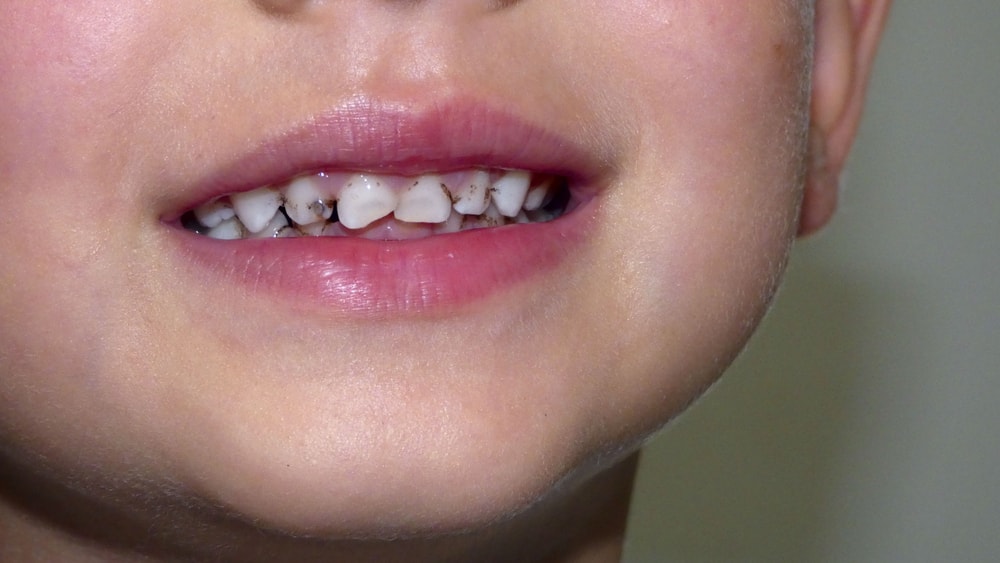
What is tooth decay?
The bacteria mutans streptococcus has a lot to answer for. This particular strain is the main culprit behind tooth decay in children and adults.
Problems occur when certain forms of bacteria accumulate to form plaque, which is full of acid that damages the protective enamel on teeth.
Over time, a hole or cavity will emerge. Left untreated, this travels deeper into the tooth and causes pain.
Children’s teeth are softer than adults, so their protective enamel layer isn’t as strong – making them more vulnerable to dental caries.
Decay can be stopped in its tracks or cured, if you seek treatment in time.
Tooth decay in children is a serious concern:
“Tooth decay can have a detrimental effect on a child’s quality of life, performance in school and success in life. The disease can cause pain, inability to chew food well, embarrassment about discolored or damaged teeth, and distraction from play and learning.”
Science Daily
Baby and toddler tooth decay doesn’t seem too ominous at first glance, since these teeth will eventually be replaced by adult teeth.
However, it can cause pain and discomfort when chewing or swallowing.
On top of this, slightly older children may feel embarrassed about having discoloured teeth at school, even if they know the “tooth fairy” will soon be on its way.
But these immediate repercussions pale in comparison to the impact that tooth decay could have on your child’s overall health.
What do I mean by this?
There’s a strong link between oral problems and poor general health, no matter our age.
Dental cavities might contribute to a lifetime of health problems for your child.
Research shows that periodontal disease can worsen existing health conditions. It also increases the risk of developing chronic illnesses such as:
- Dementia
- Heart disease
- Diabetes
- Rheumatoid arthritis
Scientists don’t know for certain what drives this link, but they believe it comes down to oral bacteria entering the bloodstream through vessels in the mouth. This boosts inflammation in the body, which is a major problem behind many systemic diseases.
No parent or guardian wants this for their child, or themselves.

Cavities are contagious too
“When Rachel Sarah took her daughter in for her first dental checkup a few years ago, she got a surprise. Not only did her 24-month-old have two cavities in her baby teeth, the pediatric dentist suggested she might have “caught” them from her mom. “The dentist handed me this piece of paper that talked about saliva transfer,” said Sarah, a 37-year-old writer from San Francisco. “It said not to share cups or utensils or food and said, ‘No kissing your kid on the lips.’ I was shocked; I’d been taking a bite of food and then giving her a bite since she started eating. I told the dentist I’d never heard of this and he said these were new findings.”
NBC News
No doubt you’re familiar with the phrase “sharing is caring”.
It doesn’t apply when you have tooth decay, which is a contagious infection.
As with the flu, you can easily pass on dental caries to your children (and other people). This occurs when people with active tooth decay participate in activities that transmit their saliva.
For example, some new mothers use their own mouths as a temporary placeholder for their baby’s pacifier, while their hands are otherwise occupied. It’s also common for adults to test the temperature of a child’s food, by tasting it first.
Other risky actions include:
- Sharing food or drink
- Cooling down food by blowing on it
- Babies or toddlers putting their fingers in your mouth
- Kissing your baby on the mouth
- Using the same toothbrush
- Sharing utensils
This behaviour spreads decay-causing bacteria from one person to another.
What does the research tell us?
Over the years, a number of studies have drawn the link between tooth decay and the contagious bacteria mutans streptococcus. Some have even gone so far as to call it the “most common infectious-contagious worldwide disease.”
There’s strong evidence this bacteria is transmitted from mother to baby, according to a 2017 report in the South African Dental Journal.
And it seems the higher the presence of S. mutans bacteria in your saliva, the higher the chance of transmission.
The Australian Dental Journal cites a study where mothers with more than 106 organisms of s.mutans per millilitre of saliva have a greater than 50 per cent chance of passing on the bacteria to their baby. This is 20 per cent higher than mothers with only 103 organisms per millilitre.
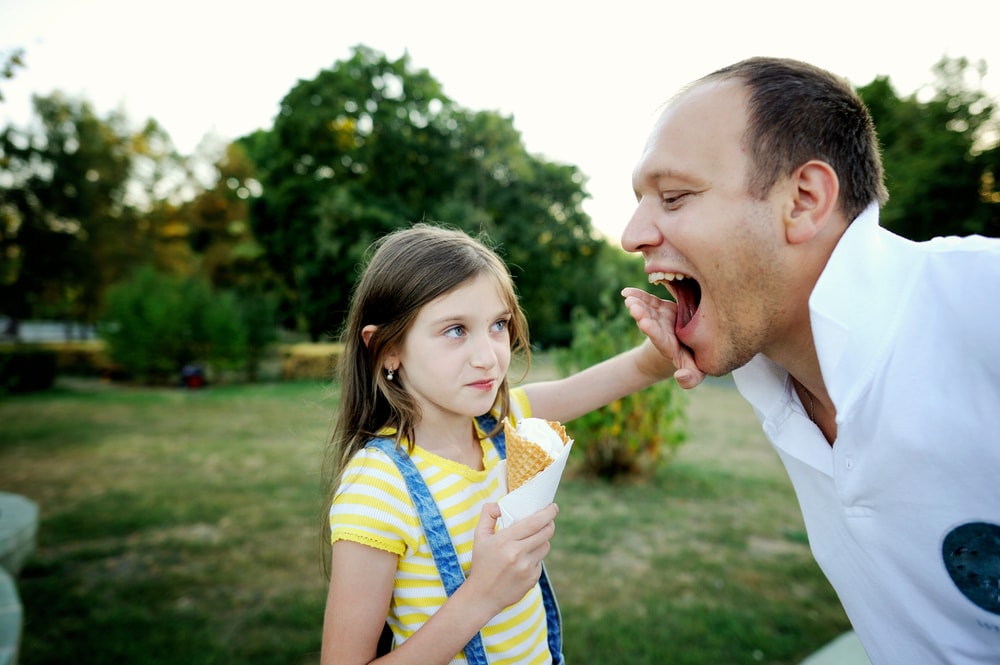
How to prevent contagious tooth decay in children:
The preventive solutions make sense when you know the risks of transmitting dental caries.
To avoid spreading tooth decay:
- Don’t share food, cups, toothbrushes or utensils
- Keep baby’s pacifier away from your mouth and clean it in the sink when dirty
- Cover your mouth when you sneeze or cough
- Don’t blow on food to cool it down
- Don’t peck your baby on the mouth
- Don’t let other children or animals share saliva with your young child
It’s also important to gently wipe your baby or toddler’s mouth with a clean and soft wet cloth, multiple times a day. Cleaning the tongue, cheeks and teeth dissuades colonies of bacteria from sticking around.
“When you look at a lab test, yes, there’s transfer of bacteria, but in real life, you’re not going to be able prevent that. You can’t live in a bubble.”
Dr. Stephanie Su, NBC News
Even the most diligent of parents may slip up sometimes and share a mouthful with their child. It’s difficult to stay on track all of the time, so this is bound to happen every now and then. This is another reason why you must take care of your own oral health, so you have no active cavities to spread!
You can protect your dental health by:
- Daily brushing and flossing with a fluoride toothpaste
- Less indulging on sugary foods and beverages
- Visit your dentist for regular check-ups and cleaning sessions
Please note:
Women need to take extra precautions during pregnancy, when they’re more susceptible to tooth decay.
These measures can prevent oral bacteria from spreading from one person to another.
Having said this, we need to remember that transmission is simply one risk factor and there are other causes behind tooth decay.
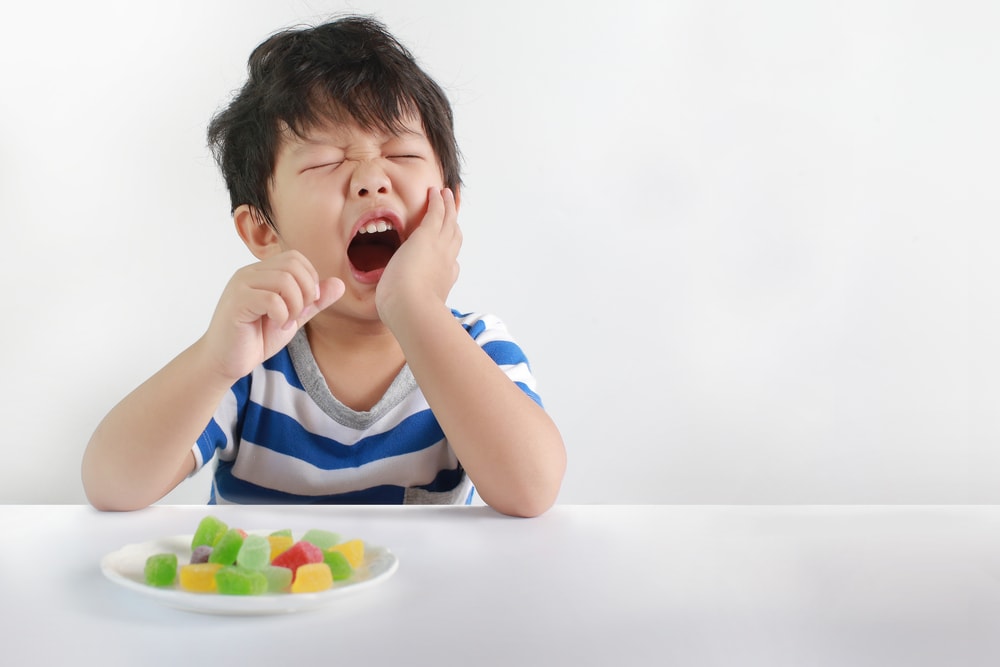
Other causes of tooth decay in children:
Too much sugar
We’re in the midst of a tooth decay crisis in NSW, as more than 100 children have their rotting teeth extracted or treated under general anaesthetic.
Every week, that is.
Sugar is largely to blame, as children reach for large quantities of processed foods and sweet drinks.
The World Health Organisation tells us to consume no more than 6 teaspoons of added and natural sugars per day.
Even babies and toddlers are enjoying more than their share of sucrose, fructose and glucose. Limit their intake of fruit juice or sweetened drinks – a major culprit!
Research shows that excess sugar lowers the amount of good bacteria in our mouths. We need as many of these vital microbes as we can get, since they guard against tooth decay.
Encourage your children to eat these healthy foods to strengthen plaque-fighting bacteria:
- Yoghurt and cheese
- Milk kefir
- Sauerkraut and kimchi
- Sourdough bread
- Sour pickles
- Miso
- Tempeh
- Enhanced milk
Not cleaning their teeth well enough
A powerful oral hygiene routine helps to prevent plaque from accumulating on our teeth and gums. We need to brush our teeth twice a day to reduce the chances of tooth decay.
Unfortunately only half of all Australians follow this advice.
This sets a terrible example for children, who must adopt good habits from an early age.
A poll by The Conversation found that one-third of children don’t brush their teeth enough.
For young children:
- Make sure they brush their teeth properly twice a day.
- An electric toothbrush with colourful designs makes the process fun
- Use a children’s toothpaste with 400-550 ppm of fluoride (less than standard products)
- Encourage good flossing habits
For babies and toddlers:
- Before the first tooth: gently wipe gums with a wet and clean cloth
- After the first tooth: brush with a teether toothbrush using plain water at the end of the day
- No toothpaste with fluoride until they’re over 18 months
- 18 months to 2 years: brush with a tiny amount of low-fluoride toothpaste twice a day
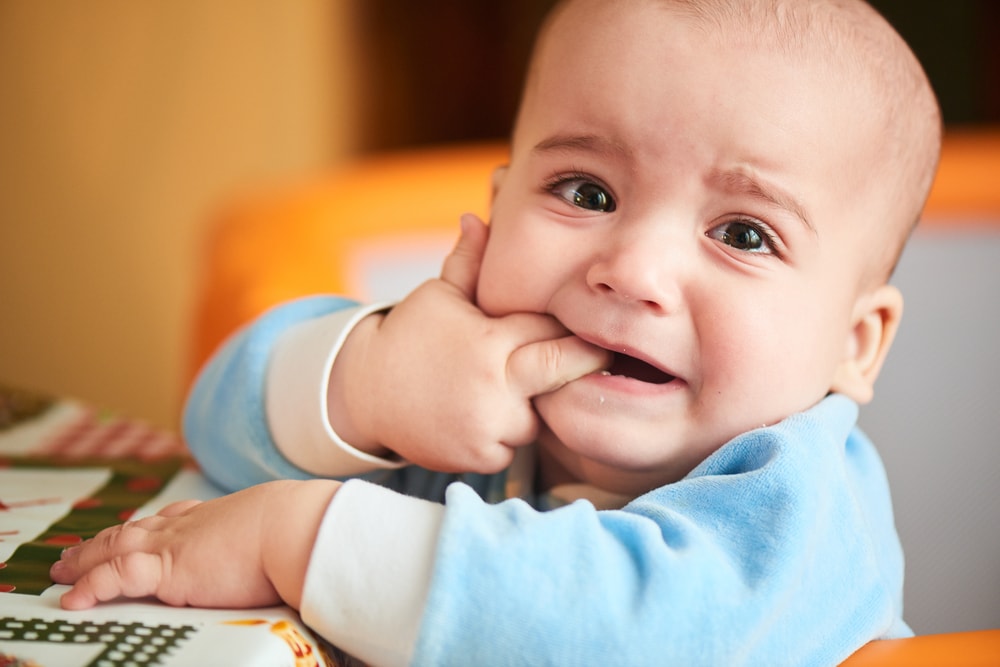
Baby bottle tooth decay
Milk contains lactose, which is a type of sugar that feeds bacteria.
Many babies are bottle or breastfed to lull them to sleep at night. Saliva usually helps to prevent sugar from accumulating, but production is low during sleep.
Tooth decay can occur if milk regularly pools or lingers in one area of the mouth for too long.
Having said this, many parents have no problems when feeding their babies milk at night.
To minimise the risk:
- Gently wipe their teeth with a wet and clean cloth after the session
- End the milk feed with a few sips of water from a separate bottle
Asthma inhalers or puffers
Inhalers and puffers play a vital role in helping children to manage their asthma, but problems may arise if oral hygiene is neglected.
Some puffers contain acidic powder, which weakens tooth enamel, leading to cavities over time.
To combat this, make sure your child cleans their teeth twice a day with toothpaste (do it for them if they’re too young).
They need to wait at least thirty minutes to an hour after using their puffer before brushing, to avoid scratching the acid into their teeth.
Certain medications
Some medications contain hidden sugar, but most people don’t check the label or ask for a sugar-free alternative (if one is available).
Your child can rinse their mouth with water after taking medicine that contains sugar.
Certain medications also reduce the amount of saliva that children produce. This can be a problem if it’s a long-term prescription, since saliva acts as a guard against bacteria.
Apples, chewy vegetables, citrus fruits and hard cheeses are some foods that help to increase saliva production. Make sure your child rinses their mouth with water after eating acidic foods, to restore pH balance.
Chewing on sugar-free gum is another tip for older children who need to produce more saliva.
Molar hypomineralisation in children
One in six Australian children suffer from this painful developmental condition that causes “chalky teeth” to emerge around the age of six. These teeth lack healthy enamel and rot easily.
Make an appointment with your dentist if you see any of these signs:
- Bright white spots or light brown spots on teeth
- Creamy, yellow or brown patches
- Pain or sensitivity when eating
- Toothaches after brushing
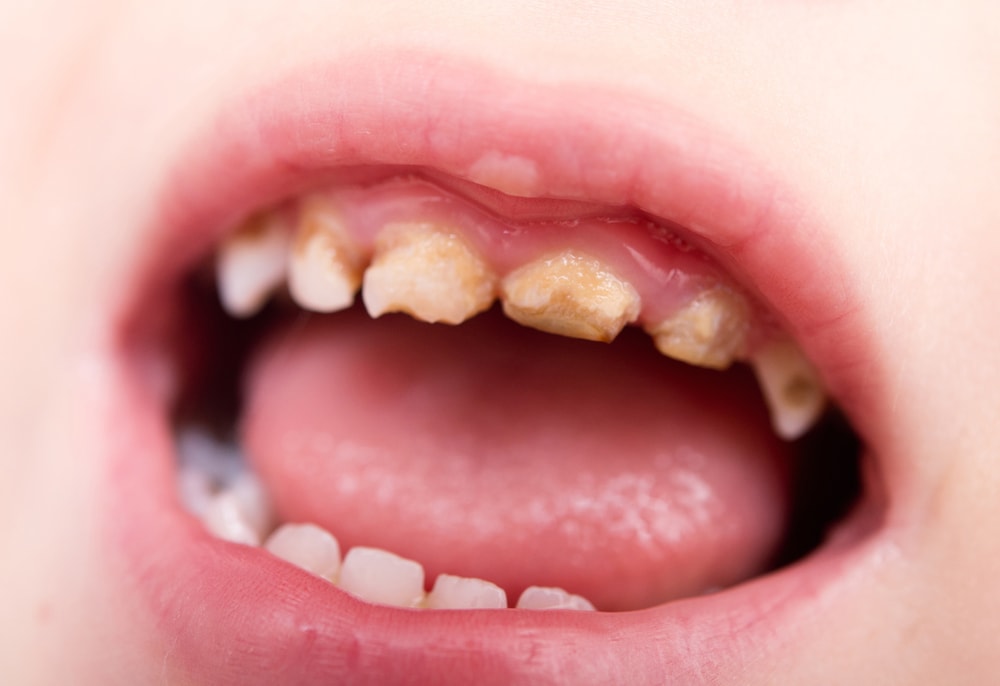
Signs of tooth decay in children, toddlers and babies:
“You can easily check the state of your child’s teeth by lifting their top and bottom lips and checking for white patches, which are the early warning signs for decay, and can be reversed. Grey, brown or black spots indicate more serious decay; in either case, book an appointment with your dentist as soon as possible.”
Australian Dental Association
It’s easy to miss the signs of baby or toddler tooth decay, which develops over time.
Look out for these signs:
- A dull white band that’s close to the gum line (the first stage)
- A yellow, brown or black band close to the gum line (progression)
- Brownish-black stumps for teeth (advanced)
- Toothache
- Sensitive teeth, especially when consuming hot or cold food and drinks
- Brown, black or grey spots on teeth
- Bad breath
How often should children visit the dentist?
Early forms of tooth decay in children can be prevented or reversed, if you get to your dentist in time.
The government understands how critical this is, which is why eligible families can receive up to $1000 to cover private or public dental services for their offspring over a two year period.
This applies to children aged between two and 17.
What about baby’s first dental visit?
Parents often ask me when this should be. My advice is to book an appointment when their first tooth starts to emerge, or after 12 months. Don’t hesitate to bring your child in sooner, if you’re worried, since early signs of tooth decay can be treated if caught in time!
Mona Vale Dental can take care of your child’s teeth
Our staff are experienced at detecting and treating tooth decay in babies, toddlers and children. We make sure that kids of all ages feel comfortable and safe at our clinic!
Early intervention is the key to recovery, so please contact us on (02) 9997 1100 if you have any concerns.
